
Your company is going global. And now, you find yourself weighing the pros and cons of two options: professional translation agencies vs. machine translation.
While both have their benefits, the difference in quality between the two is striking. In this article, we’ll provide insights into why human translation remains the best choice for companies seeking high-quality localization, despite the allure of machine translation for cost-effective, high-volume projects.
What is machine translation, really?
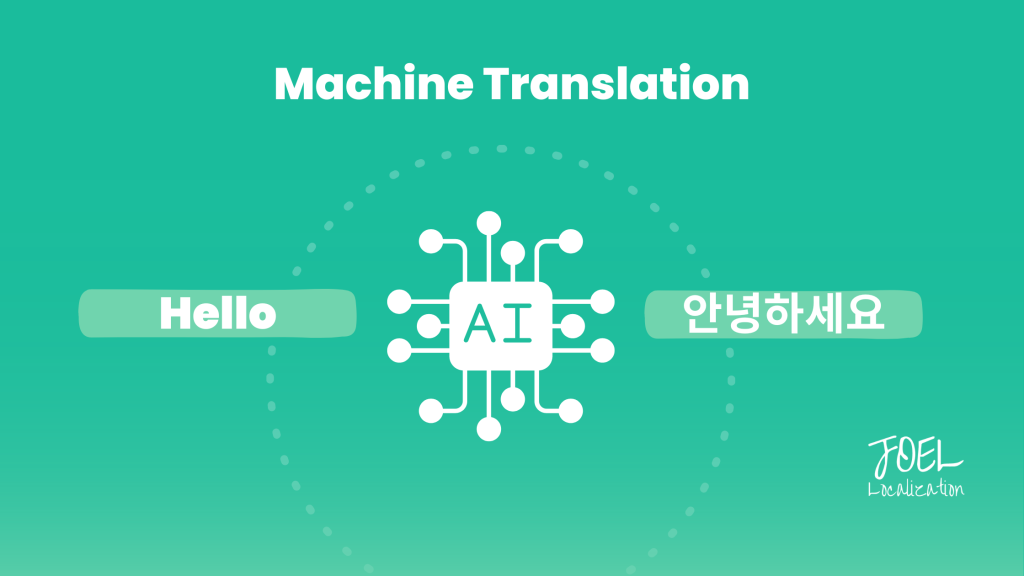
Put simply, machine translation uses artificial intelligence (AI) to translate text between different languages. As a computer does everything, there is no human involvement.
Instead, machine translation (or, more accurately, neural machine translation) uses artificial neural networks (ANN), which are simulations of the human brain that have been trained with data sets.
Using these data sets, the machine reads the source text and predicts what the translation should be.
How accurate is machine translation?
Machine translation has yet to reach the level of perfection that makes human intervention unnecessary. Ever used Google Translate and ended up with a word salad that made no sense? Then, you can probably attest to that.
Nonetheless, a study from 2021 showed that Google translations of medical instructions had an accuracy rate of 94% from Spanish. Moreover, other languages like Tagalog, Korean, and Chinese all showed high accuracy rates.
So, what gives? With such high accuracy rates, can’t you just use machine translation for everything and call it a day?
Not quite.
For one, the quality and accuracy of MT solutions varies depending on content and language—and also the types of machine translation you are using. The machine translation of technical documents are often more accurate compared to marketing content. That is because the latter requires more creativity and adaptation for the local market.
There are also other concerns related to using MT, which we will get into in the next few sections.
What are the advantages of machine translation in localization?
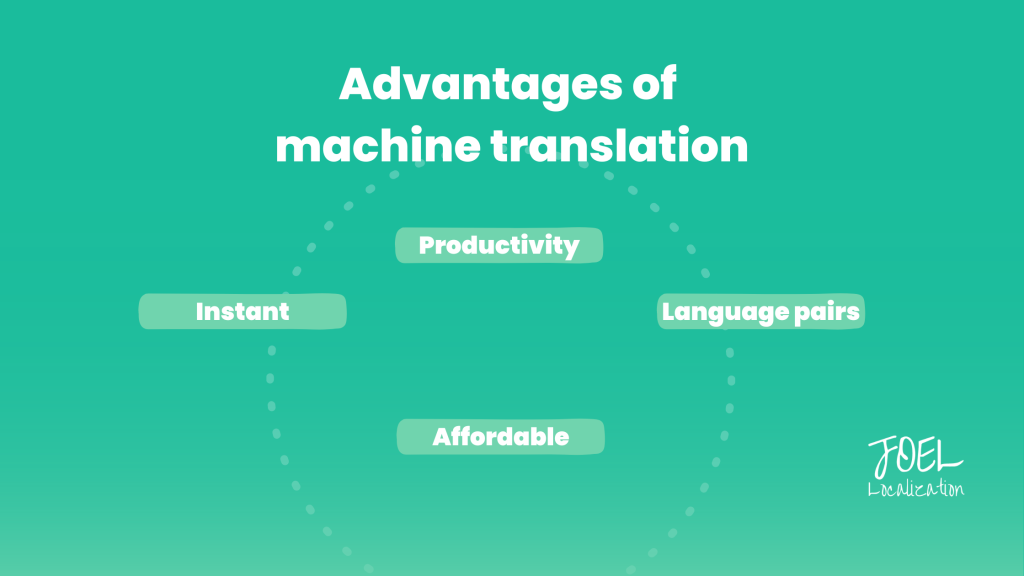
First, we will look at how machine translation can have a positive impact on localization, and cases where you might want to implement it in your workflow.
1. Machine translation is instant.
With machine translation, you can automate the translation process for large amounts of content in a short amount of time.
2. Machine translation can have more available language pairs.
The world has more than 7,000 languages. Not all of those pairs have enough native language speakers to justify investing in human translation, or even enough translators available in the first place.
3. Machine translation is affordable.
Many MT sites and online translation tools are available for free for normal amount of use, while higher quality machine translation engines are available behind paywalls. Compared to using only human translators, using machine translation can help you save as much as half of the average translation rate quoted by agencies.
4. Machine translation can be a tool to boost productivity for human translators.
Since many CAT tools and translation management systems (TMS) these days have built-in MT features (including translation memories), machine translation has become a big part of translators’ daily workflows. As a result, 80% of translators report using machine translation in 2022, according to the ProZ translation industry report from 2022.
In other words, machine translation software might be the best option for you if:
- You want to scale your business as fast as possible.
- You have a limited budget, but a lot of content.
- You are not too concerned with translation quality, and just want a solution to communicate your messages to your audience in a way that they will understand (at your own risk).
- You want to use a mix of human and machine translation.
Why human translators and agencies are the better choice
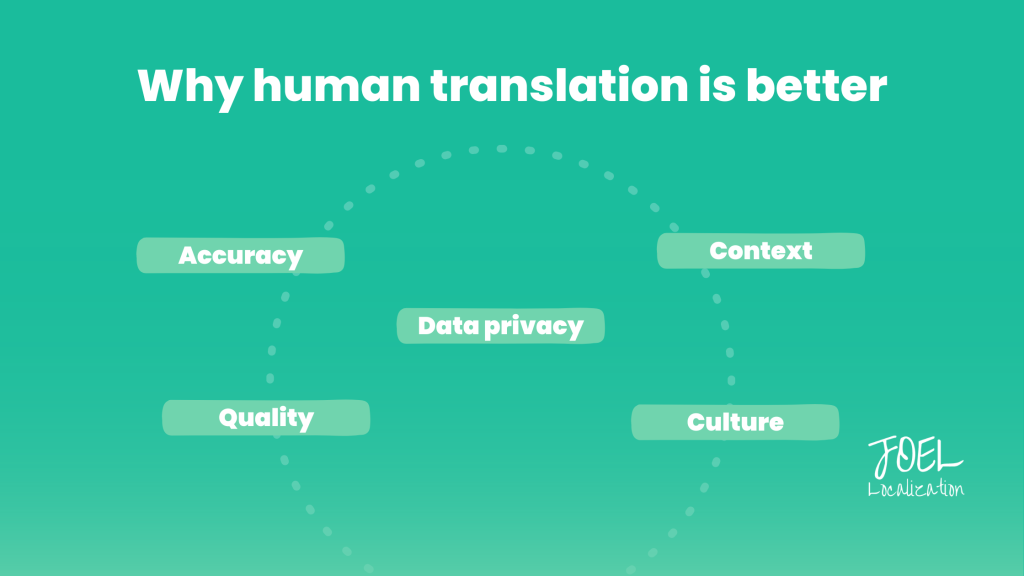
There are some disadvantages to MT that you will need to consider when implementing it in your localization workflow—especially when making the choice of how to localize your content for global audiences.
1. Human translators can ensure high-quality translations with greater accuracy
We have established that MT is not always accurate. To be fair, neither are human translations! But there is a difference between running your text through Google Translate and calling it a day, and relying on a translation agency with professional translators and strict quality procedures in place.
At JOEL Localization, we are not against using machine translation as part of our workflow. We are open to and have worked for many clients in the past who have requested us to post-edit machine translation outputs.
But, our main offer is human translation, and we always make sure each translation is carefully translated, edited and proofread by native speakers at each workflow stage to miss any mistakes and errors.
2. Human translators are less likely to miss context and nuances
Humans are good at understanding context and nuances of the language. Machines, unfortunately, may understand words and patterns, but their contextual understanding is still not up to par with humans yet.
3. Human translators understand the target audience, industry, and market
Experienced human translators are better equipped to take into account cultural nuances, slangs, and other factors that may not be picked up by machine translation software. In other words, if you want your source text to deliver the same experience, feelings, and emotions in the target language, human translators (paired with quality assurance) are your best bet.
4. There may be issues with anonymity and data protection when using some MT platforms
Businesses worry a lot about maintaining anonymity and data confidentiality, especially in the wake of GDPR. It is especially a concern when using unvetted machine translation tools, which may use data from translations to train their models.
You may have these concerns with humans as well, but at least then you will be protected by the law. For example, we have our managers and translators sign nondisclosure agreements if necessary to ensure the security of our client’s information.
5. Humans can help you with project management
You may need some more help with localization that goes beyond just translation. At JOEL Localization, we offer a turnkey solution that takes care of all your localization needs, designing and managing the project from end to end.
Example of translation agencies vs. machine translation: Marketing Copy
Content related to sales and marketing is one of the hardest categories for MT to get right.
Just look at this marketing site home page by Notion, one of our clients at JOEL Localization. As an experiment, we ran the hero headline copy through Google Translate to see what it would come up with in Korean.
The result is an awkward and stilted translation that does not come close to conveying the same feeling or tone for the target audience.
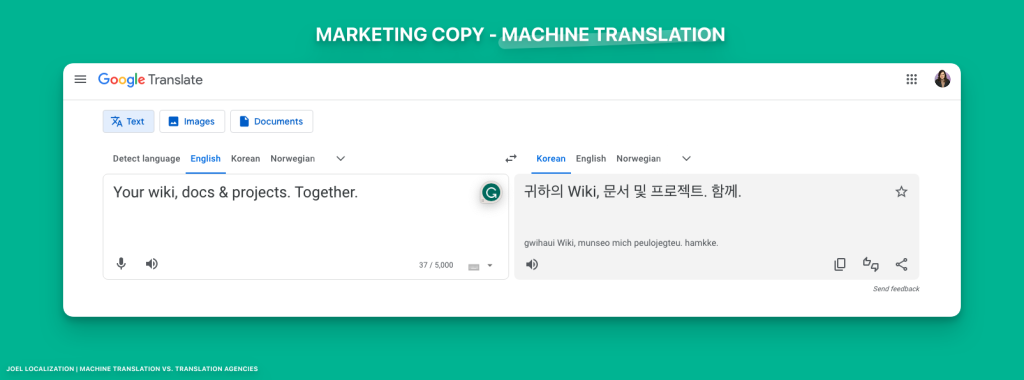
Why?
- Tone of voice. It uses the words 귀하 and 및, both of which are formal words you would be more likely to see in legal texts. These two words may be accurate, but not in line with Notion’s tone of voice and unlikely to resonate with their target audience.
- Choice of words. It is a word-for-word, direct translation of the source text. 귀하 does indeed translate to you, but marketing copy in Korean is much more likely to be written in first person rather than second person.
- Clarity. The machine translated copy fails to make it clear to the target audience what the product does in language that speaks to them.
Then, what about human translation? Here is how our translators at JOEL Localization handled the same line of copy with marketing transcreation.
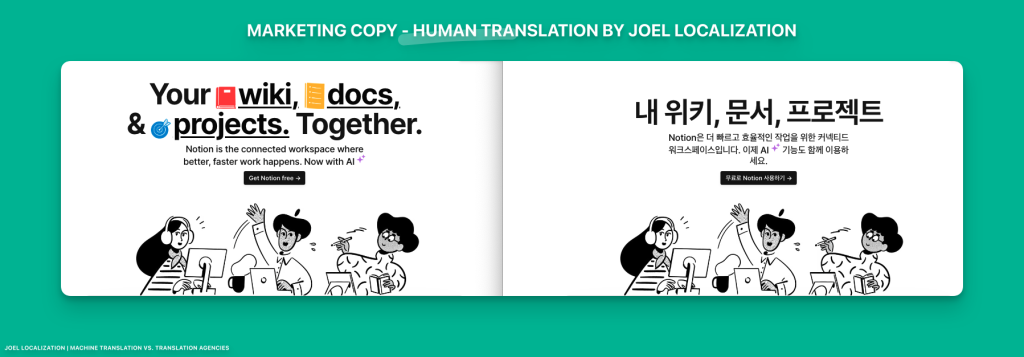
The final copy, “내 위키, 문서, 프로젝트” would translate directly to “My Wiki, Documents, and Projects” in English.
By using first person and concisely summarizing the product’s capability in language more likely to resonate with Korean speakers, this example is only one of many showing how human translation outclasses MT in almost every situation.
Get accurate translations today
Looking for localization services that prioritize quality and precision? Our team of skilled human translators ensures accurate and culturally appropriate translations that machine translation can’t match. Reach out to Joel Localization for a quote today.
